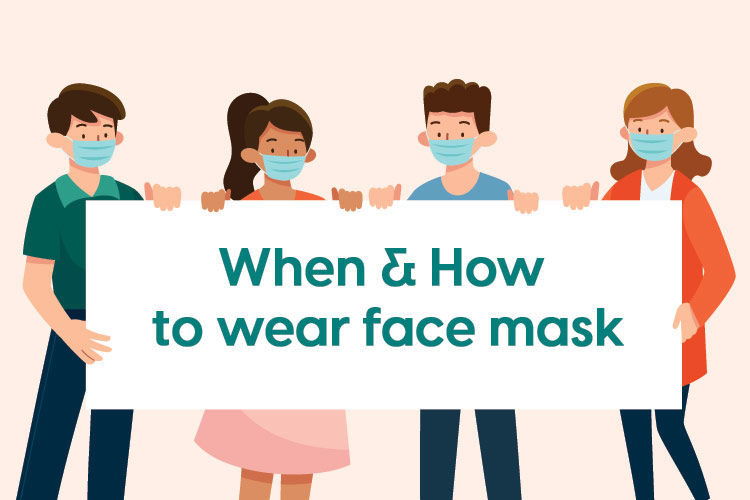Face masks: when and how to wear one
A face mask is a material you wear that covers your nose and mouth. Wearing one helps stop the spread of COVID-19 (coronavirus), especially from people who do not know they have the virus.
COVID-19 is mainly spread through droplets that come from your nose and mouth. For example, when you cough, sneeze or talk loudly. It can also be spread by smaller particles (aerosols).
Wearing a face mask that covers your mouth and nose reduces the spread of these droplets and aerosols.
Do
- clean your hands properly when you put on and take off your face mask
- cover your mouth and nose and make sure there are no gaps between your face and the mask
- remove it from behind – do not touch the front of the mask
- carry unused face masks in a clean sealable bag such as a ziplock freezer bag, paper bag or cloth bag
- carry a second similar type bag to put used face masks in
Don’t
- do not touch your face mask while wearing it – if you do, clean your hands properly
- do not use a wet or soiled face mask
- do not share face masks
- do not lower your face mask to speak, eat, smoke or vape
- do not throw away face masks in public places – you risk infecting others
- do not put single-use masks in a recycling bin – they cannot be recycled

When to wear a medical face mask
A medical face mask is a blue disposable type of face mask. It gives you better protection from COVID-19.
Wear a medical face mask instead of a cloth face mask if you are at higher risk from COVID-19. For example, if you are over 70 years of age or you have an underlying conditon.
Wear a medical face mask at home if you:
- have symptoms of COVID-19
- have tested positive for COVID-19 – you still need to self-isolate (stay in your room)
- are living with someone who has COVID-19
- are caring for someone who has COVID-19
If you have any symptoms of COVID-19, self-isolate (stay in your room) and get a COVID-19 test.
Read about the different types of face coverings, masks and visors
Who should not wear a face mask
You do not have to wear a face mask if you have an illness or impairment that would make wearing a face mask difficult.
Face masks are not recommended for anyone who:
- has trouble breathing
- is unconscious or incapacitated
- is unable to remove it without help
- has special needs and who may feel upset or very uncomfortable wearing them
- needs to communicate with someone who has learning difficulties, is hard of hearing or deaf
Wearing a visor will give these people some protection. But cloth face masks are a better way to protect yourself from COVID-19.
Storing face masks
Store your face mask at home in a dry, breathable bag to keep it clean between use. For example, a paper or cloth bag.
Washing cloth face masks
Wash your cloth face mask whenever it gets dirty or at least every day.
You do not need to sterilise face masks. Wash them in a washing machine or by hand.
When to throw out a face mask
Throw out a reusable face mask if it:
- no longer covers the nose and mouth
- has loose or damaged ties or straps
- does not stay in place on your face
- has holes or tears in the fabric
Throw out medical face masks after you wear them once. Do not wash or reuse them.
Source: HSE

